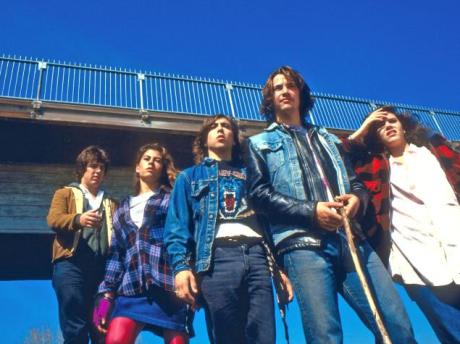Generally, anytime a classroom discussion about history or literature arises within a film, the intention is didactic, inserting overt connections and literal interpretations of the surrounding text into a forum where such on-the-nose conversation is contextually appropriate. In the case of the overtly analytical mid-'80s conservative plea, River's Edge, the first act classroom scene establishes that the now defunct hippie ideology is the overall antagonist, having decimated the standard family unit and aided the rise of women's liberation, thus eliminating the traditional role of woman as caretaker and mother.
This assertion is then reiterated by the story itself. Samson Tollet (Daniel Roebuck) kills his girlfriend, strips her—and presumably rapes her dead body, establishing a later connection between sex, death and the element of control—and leaves her by the river (an intentional visual metaphor). Seemingly indifferent to his actions, he brings his friends Layne (Crispin Glover) and Matt (Keanu Reeves) to check out the body, which is where the thesis of generational numbness and an absent moral lexicon drives the story forward. Each character responds to the death with minimal emotion and tagged on ambivalence about either supporting their friend or turning him in.
To provide an exaggerated example of the sort of dilapidated family unit causing this widespread apathy and anarchic sensibility amongst the teens, Matt's family is depicted as being in a constant state of turmoil. His mother works constantly to support her three children and an abusive boyfriend and is perpetually rushing around to fill in the blanks of the surmounting conflict between her sons and daughter. Matt routinely stays out all night and her effeminate middle child, Tim (Joshua Miller), routinely subjects his younger sister to emotional abuse, stealing her doll and denigrating its ersatz grave.
And while the mother works, struggling to make ends meet, Matt and Tim are off buying drugs from a Vietnam veteran (Dennis Hopper), whose identity is that of garish irrelevance within the '80s context, acting as a ghost—and victim—of the hippie ethos .
Though exaggerated for dramatic effect and constructed deliberately to assert a staunchly conservative concept—grossly ignoring the freedom from subjugation that this oppressive, counter-traditionalist modern way of life provided many—this pedagogical teen melodrama does capture its era quite astutely. In times of change, the unknown, or lack of tangible first-hand experience, is in itself a form of annihilation anxiety. And in the case of River's Edge, the dread of moral deterioration and social breakdown is, contextually, a logical response to a dramatic shift in gender role performance.
In fact, to this day, nostalgia is still a driving force in the works of heteronormative men, wherein angst for the memories substitutes for their lack of control, which, interestingly enough, is the very thing that causes Samson to strangle and rape his girlfriend's dead body for "shooting off her mouth" in this film.
River's Edge screens at the TIFF Bell Lightbox as part of the Whoa: The Films of Keanu Reeves retrospective at 9:45pm on January 25th, 2013.
(Hemdale)This assertion is then reiterated by the story itself. Samson Tollet (Daniel Roebuck) kills his girlfriend, strips her—and presumably rapes her dead body, establishing a later connection between sex, death and the element of control—and leaves her by the river (an intentional visual metaphor). Seemingly indifferent to his actions, he brings his friends Layne (Crispin Glover) and Matt (Keanu Reeves) to check out the body, which is where the thesis of generational numbness and an absent moral lexicon drives the story forward. Each character responds to the death with minimal emotion and tagged on ambivalence about either supporting their friend or turning him in.
To provide an exaggerated example of the sort of dilapidated family unit causing this widespread apathy and anarchic sensibility amongst the teens, Matt's family is depicted as being in a constant state of turmoil. His mother works constantly to support her three children and an abusive boyfriend and is perpetually rushing around to fill in the blanks of the surmounting conflict between her sons and daughter. Matt routinely stays out all night and her effeminate middle child, Tim (Joshua Miller), routinely subjects his younger sister to emotional abuse, stealing her doll and denigrating its ersatz grave.
And while the mother works, struggling to make ends meet, Matt and Tim are off buying drugs from a Vietnam veteran (Dennis Hopper), whose identity is that of garish irrelevance within the '80s context, acting as a ghost—and victim—of the hippie ethos .
Though exaggerated for dramatic effect and constructed deliberately to assert a staunchly conservative concept—grossly ignoring the freedom from subjugation that this oppressive, counter-traditionalist modern way of life provided many—this pedagogical teen melodrama does capture its era quite astutely. In times of change, the unknown, or lack of tangible first-hand experience, is in itself a form of annihilation anxiety. And in the case of River's Edge, the dread of moral deterioration and social breakdown is, contextually, a logical response to a dramatic shift in gender role performance.
In fact, to this day, nostalgia is still a driving force in the works of heteronormative men, wherein angst for the memories substitutes for their lack of control, which, interestingly enough, is the very thing that causes Samson to strangle and rape his girlfriend's dead body for "shooting off her mouth" in this film.
River's Edge screens at the TIFF Bell Lightbox as part of the Whoa: The Films of Keanu Reeves retrospective at 9:45pm on January 25th, 2013.
